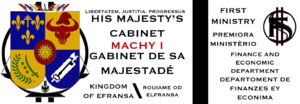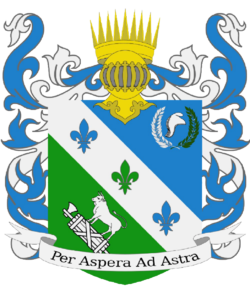First Ministry (Efransa)
| Premiora Ministèrio od Elfransa | |
 Logo of the First Ministry | |
| Executive Department overview | |
|---|---|
| Formed | 27 April 2020 |
| Jurisdiction | Kingdom of Efransa |
| Headquarters | Parsrid |
| Employees | 1 |
| Annual budget | 0Fr |
| Ministers responsible |
|
| Parent department | His Majesty’s Cabinet |
| Child agencies |
|
| Key document |
|
The First Ministry (Efrasachin: Premiora Ministèrio), officially the First Ministry of the Kingdom of Efransa (Efrasachin: Premiora Ministèrio du Rouiame od Elfransa), is an executive department of His Majesty’s Government. The First Ministry oversees all financial/economic and justice policies. The Prime Minister is the head of the First Ministry, currently the Countess of Machy, whom is assisted by the Minister of State, the position is currently vacant.
The First Ministry is the only of the four Cabinet Ministries not established based on the Constitution. Because of this the constitutionality of the First Ministry has been called into question, but the King ruled that it is constitutional, and no appeals have been made to the Constitutional Council.
The First Ministry’s official headquarters is as at the Banco du Premiora Ministèria in Parsrid, while most operations are conducted from the Executive Seats in Limone, mixed with some online operations, which have been expanded during the COVID era.
History
The First Ministry was preceded by various different agencies in Efransa’s various predecessors states, due to its wide range of functions.
Some of these include finance ministries, industry ministries, budget offices, central banks, justice ministries, defense ministries, intelligence agencies, cabinet offices, etc.
Structure
The Prime Minister is the chief executive of the First Ministry. However, due to their duties as head of government, the Minister of State is the operating administrator of the First Ministry. The functions of the First Ministry are divided amongst the Finance and Economic Department and the Justice Department, the Interministry Department is a de facto Department, because the Prime Minister oversees independent agencies.
His Majesty’s Public Service
The First Ministry has overall responsibility for His Majesty’s Public Service, the civil service of Efransa. The Public Service is an agency consisting of all government officials, excluding the cabinet, Parliament, and the Judiciary. The the Chief Secretary for Public Service is the administrative head of the Public Service, and is a Cabinet Minister designated by the Prime Minister, although traditionally the Deputy Prime Minister is usually appointee, currently the Viscount Chatham.
HM Public Service is divided into the Civil Service and technically the Foreign Service, however, the Foreign Service is under the jurisdiction of the Ministry of Foreign Relations. The Civil Service is administered by the Director of Civil Service and the Chief Secretary for Public Service.
Finance and Economic Department

The Finance and Economic Department (FED) (Efrasachin: Departoment de Finanzes ey Econima) is equivalent to a treasury ministry in other countries and oversees all aspects of national finance and regulation of the economy through its various child agencies. The FED is administered by the Chief Financial and Economic Officer.
Most functions of the Department are organized into three (or four) primary agencies: His Majesty’s Treasury, Internal Revenue Agency, the Reserve Bank, and the Comptroller of the Currency, although the latter is technically also part of the Reserve Bank.
HM Treasury keeps all government treasures, and manages government transactions, all through the Council of Treasury Secretaries. The IRA collects taxes and other government revenue, while the Reserve Bank oversees the production and circulation of the Fraseta, while the latter function is more often handled by the Comptroller. The Reserve Bank also regulates banking.
The Board of Economic Directors oversees the strength of the economy, as well as regulations stock prices and other economic policies. The Board of Business Supervisors assures that all business follow the “people over pay” maxim. The Office of Financial and Economic Regulations recommends regulatory policies to the CFO, while the Fiscal Management and Budget Agency develops plans for the Treasury to manage government finances.
Justice Department
The Justice Department oversees all aspects of the judicial process from administration of the High Court, to parole. The entire Justice Department is administered by the Attorney-General. His Majesty’s Solicitor-General is the chief lawyer for the government in civil and administrative proceedings.
The State Prosecution Service is overseen by State Prosecutor and has three Deputy State Prosecutors, responsible for all prosecutions. The People’s Defense Office is responsible for all public defense, overseen by the People’s Defender, who is assisted by then Assistant People’s Defender.
The Justice Department also oversees the three court enforcement agencies (not to be confused with the National Police, the law enforcement agency), the Lord High Sheriff’s Office is the enforcer of the Civil Chamber, General Courts (as Courts of Session), and other Civil Courts. The Bureau of Corrections oversees the corrections system, while the Superior Marshal enforces the Administrative courts.
The Bureau of Corrections oversees both of His Majesty’s Prisons and all other punishments. The BoC is overseen by the Grand Baliff of Efransa. The Lord High Gurter is perhaps the most prominent and important position in the BoC. Others include the Chief Sandwicher, the Prison Wardens, the Secretary of Fines, and the Probation Councilor.
The Central Parole Board can release any people from His Majesty’s Prisons (although the maximum sentence is ten minutes), after any where from two to four minutes. The CPB consist of the Chairman and a Commissioner of Paroles. The CPB can also grand commutations of sentences and advises the King in his power of doing the same, as well as granting pardons.
Interministry Department
The Interministry Department is a de facto division of the First Ministry, commonly defined as the independent agencies of His Majesty’s Cabinet. This was established because the Prime Minister oversees independent agencies separate from the Cabinet.
The Commander of the Royal Army and the Royal Army are part of the First Ministry, as is the National Intelligence Service, the National Elections Commission (technically part of the legislative branch), among others.
